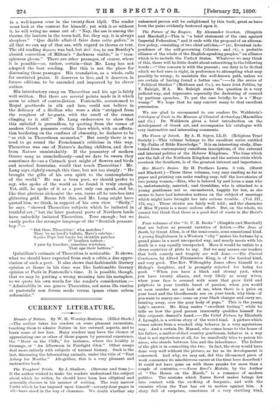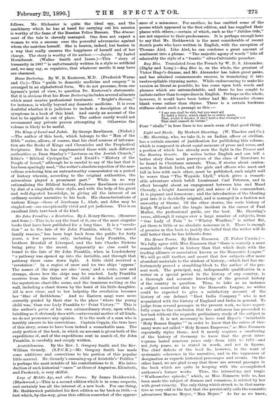Her Heart's Desire. By H. Prothero Lewis. 3 vols. (Hurst
and Blackett.)—These three volumes, very easy reading as far as paper and printing can make reading easy, tell the love-stories of two young women,—Eira, who is beloved by and loves a man who is, unfortunately, married ; and Geraldine, who is attached to a young gentleman not so encumbered, happily for her, as she seems to have had heterodox notions on the subject of marriage which might have brought her into serious trouble. (Vol.
173, seq.) These stories are fairly well told ; and the character of Miss Wynnie is a more serious effort. But, on the whole, we cannot but think that there is a good deal of waste in Her Heart's Desire.
Four volumes of the "0. U. R. Books" (Simpkin and Marshall) that are before us present varieties of fiction :—The Jaws of Death, by Grant Allen, is of the semi-comic, semi-sensational kind. A young Englishman in a Western " city " makes his fortune by a grand piano in a most unexpected way, and nearly meets with his death in a way equally unexpected. More it would be unfair to a clever contriver of plots to say. But we may assure our readers that both comedy and tragedy are well done.—The Clerical Cracksman, by Alfred Fitzmaurice King, is of the farcical kind, and very good. The Rev. Willoughby Jones offers himself to a Bishop's daughter, and is promptly rejected for being too good. " When you have a black and stormy past, when you have twenty aliases, and very likely as many wives, when your face is covered with scars that grow livid and palpitate in your terrible burst of passion, when you would as- soon murder me as look at me, when there is a price on your head and the bloodhounds are on your track, why then—if you want to marry me—come on your black charger and carry me, fainting away, over the gory body of papa." This is the young lady's answer. Mr. King makes "excellent fooling" while he tells us how the good parson innocently qualifies himself for this exigeante damsel's hand. —The Veiled Picture; by Elizabeth J. Lysaght, is a serious story of the weird kind. A picture which comes ashore from a wrecked ship behaves in a very mysterious way. And a certain Dr. Manuel, who comes home to the house of his father, a matter-of-fact country gentleman, behaves in a way that is not mysterious at all, for he manifestly tries to poison his niece, who stands between him and the inheritance. The failure of the plot is in connecting the two. In fact, the story would have done very well without the picture, as far as its development is concerned. And why, we may ask, did this ill-omened piece of work commence its mischievous career at the time here described ? It could not have gone on with these pranks for more than a couple of centuries. —Nurse Revel's Mistake, by the Author of " The House on the Marsh," is a romance of modern politics. The mistake which Nurse Revel makes brings her into contact with the ex-King of Sergania, and with the enemies whom the Tsar has- set in motion against him. A story full of surprises, sometimes of a very startling kind, follows. `Mr. Silehester is quite the ideal spy, and the machinery -which he has at hand for carrying out his mission is -worthy of the fame of the Russian Police Bureau. The &tunic- ment of the tale is cleverly managed. One does not expect a woman to win a success over the powerful adversaries against whom she matches herself. She is beaten, indeed, but beaten in a way that really ensures the happiness of herself and of her charge. The story is worthy of its author.—Jujube. By Isabel Hornibroek. (Walter Smith and Innes.)—This " story of humanity in 1887" is unfortunately written in a style so artificial and, we may say, so repulsive, that whatever merits it may have are obscured.







































 Previous page
Previous page